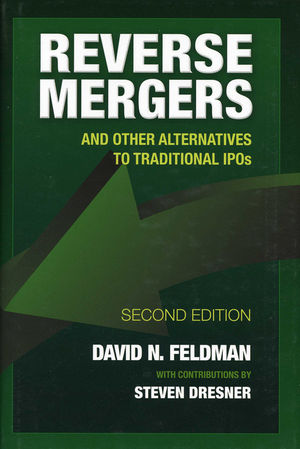Reverse Mergers: And Other Alternatives to Traditional IPOs, 2nd EditionISBN: 978-1-57660-340-6
Hardcover
304 pages
December 2009
 This is a Print-on-Demand title. It will be printed specifically to fill your order. Please allow an additional 10-15 days delivery time. The book is not returnable.
|
||||||
In good markets or bad, reverse mergers play a key role for
companies that want to avoid the IPO route for going public. Since
the successful first edition of Reverse Mergers was
published in 2006, the economic and regulatory landscape has
changed. Executives, owners, lawyers, accountants, professional
investors, regulators, and others need to know what those changes
mean for reverse mergers.
Reverse-merger expert David Feldman gives an overview of the most important changes since the previous edition was published: new SEC regulations, the changing nature of SPACs (Special-Purpose Acquisition Company), and the emergence of new instruments called WRASPs (WestPark Alternative Senior Exchange Process). The book includes a new chapter on China, and the “Experts Speak” chapter features all new interviewees.
David Feldman is one of the country’s leading experts on reverse mergers, self-filings, and other alternatives to IPOs. His firm has guided hundreds of companies on going public, advising them on structure and mechanics, financing, due diligence, regulatory issues, and more.
Reverse-merger expert David Feldman gives an overview of the most important changes since the previous edition was published: new SEC regulations, the changing nature of SPACs (Special-Purpose Acquisition Company), and the emergence of new instruments called WRASPs (WestPark Alternative Senior Exchange Process). The book includes a new chapter on China, and the “Experts Speak” chapter features all new interviewees.
David Feldman is one of the country’s leading experts on reverse mergers, self-filings, and other alternatives to IPOs. His firm has guided hundreds of companies on going public, advising them on structure and mechanics, financing, due diligence, regulatory issues, and more.



